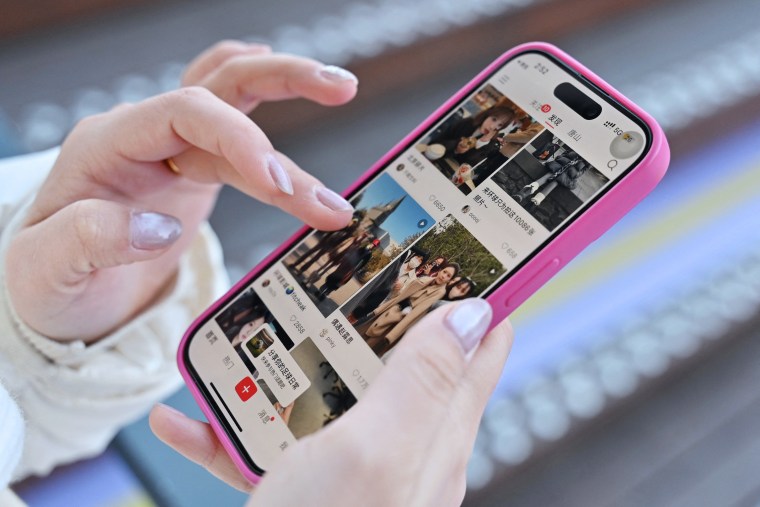A rare, joyful U.S.-Chinese exchange is taking place on RedNote, but it may not last

HONG KONG — For most people in the U.S. and China, what they hear about each other’s countries comes mostly from their governments and the media. Now they are learning directly from each other, at least for now.
The excitement is palpable on the Chinese social media platform RedNote, or Xiaohongshu (“Little Red Book”) as it’s known in Chinese, after a wave of American users set up accounts in recent days. The self-described “TikTok refugees” are seeking a replacement for the short-form video app as it faces a U.S. ban stemming from concerns over ties between TikTok’s owner, Beijing-based ByteDance, and the Chinese government.
TikTok says it will go dark when the ban takes effect Sunday unless it receives “definitive” assurances from the Biden administration, which has been “exploring options” for how to keep the app available, NBC News reported.
In protest of the looming ban, TikTok users have joined Shanghai-based RedNote, sending it to the top of Apple’s App Store and mocking U.S. security concerns as they try to navigate the Chinese-language app.
Their arrival has brought instant online connection between Americans and Chinese even as academic and other exchanges have been dampened in recent years by pandemic border restrictions and tensions between the world’s two biggest economies.
“I feel very touched to see all of the friendly American people coming here, and see we are getting to know each other and learning from each other,” said Eric Wang, a 28-year-old graphic designer from China’s Shandong province. “It makes me feel that we’re never really far away from each other.”
On RedNote, Americans and Chinese can communicate in a way they are mostly unable to on Western social media platforms such as Instagram, Facebook and X, all of which are inaccessible in China without VPNs. TikTok is also not available in China, although it does have a version there called Douyin.
“It’s very moving to see people who have never met, and who may have been misinformed about each other in the past, now engaging on equal terms and eager to learn about each other,” said Jia Yuxuan, a research associate at the Center for China and Globalization, a think tank in Beijing.
The trust that is being established through these connections “has already led to a wave of fact-checking that traditional diplomacy hasn’t been able to achieve in years,” she said.
For example, Americans on RedNote have been asking if people in China really live under a “social credit system” that scores individuals based on their behavior and blacklists them if their scores are too low.
“The Chinese netizens in the comments section are simply astonished and say, ‘This is not true,’” Jia said.
In just one day this week, the number of U.S. iPhone users on RedNote increased from about 400,000 to 1.8 million, according to data from analytics firm Similarweb, and it has since gone even higher. That is still a tiny portion of the 170 million American users on TikTok and 300 million users on Xiaohongshu overall.
The new American users could create problems for the app, which like other Chinese social media platforms is strictly controlled by government censors and is not well equipped to moderate English-language content. The situation has drawn comparisons to the Clubhouse app, which China blocked in 2021 after a brief period in which Chinese users freely discussed politically taboo topics in its chat rooms.
Xiaohongshu has not publicly commented on the influx of new users. The company did not respond to a request for comment.
Americans, meanwhile, may chafe under China’s online censorship.
“There is a very naive base of users in America, who don’t understand any of this. They’re just upset that TikTok is going to be banned,” said Christine Lu, 48, a Los Angeles-based Taiwanese American who lived in China for a decade.
It took all of five hours for Lu’s RedNote account to be banned after she signed up on Tuesday, after she purposely posted hashtags and pictures related to topics deemed sensitive in China. She said she began testing the app after seeing some American users complain that some of their posts, including ones showing cleavage or the flags of Taiwan and Tibet, were getting blocked.
“They’re posts that otherwise in free societies are very normal conversation topics,” she said.
Not all Chinese users are thrilled with the Americans piling into their online community. Some who depend on RedNote as a source of income say they may face unfair competition from their American counterparts, whose TikTok-length videos are far shorter than what is typical for the Chinese app.
“It only takes like two seconds and they’re getting hundreds, thousands and even tens of thousands of likes,” said Becca Wang, a lifestyle vlogger in Beijing.
Others say the new American users need to learn to play by the rules of the Chinese-language app and should respect the culture of its existing users, including by using the app’s Chinese name of Xiaohongshu.
“If they can’t pronounce it, they should learn,” one comment read.
Yolanda Ma, a journalism lecturer at the University of Hong Kong, said it was unclear how the app would handle the influx of American users. For example, live broadcasts are required to be in Chinese, with English and other languages considered inappropriate and subject to warnings.
If the company decides to broaden its user base, she said in an email, then the best approach would be a separate app for international users, “to both ensure the content on the platform is under control, and to keep the new users on the platform after the initial few days of excitement.”
The discussion between American and Chinese users on RedNote revolves around what they had for breakfast, how they make their morning coffee, what their front yards look like and how they make a living. Jia saw one American fisherman ask if there are fishermen in China.
“In the comment section, everybody is sharing their catch and fishing equipment,” she said.
Users are also going deeper, asking one another about salaries, debt and health care systems to compare how well they’re living under America’s capitalist system and China’s socialist system.

“The conclusion is that the ordinary workers are basically the same,” Jia said. “They’re both struggling for life, and they’re also aspiring for a better life.”
Diego Obando, a new RedNote user who lives in Pasadena, California, says the app is fairly easy to use and has a “nicer” community than TikTok. Obando, 19, said he isn’t really concerned about security, because “there’s always someone spying on you on any app you’re on.”
Beijing has so far appeared open to the idea of Americans on RedNote.
The Chinese Foreign Ministry said Wednesday that “we believe that the use of social media is a personal choice.”
“As a matter of principle, China has always supported and encouraged strengthening people-to-people exchanges and the promotion of people-to-people bonds with all countries,” spokesperson Guo Jiakun said at a regular briefing in Beijing.
Chinese state media coverage has also been positive.
“Moving to RedNote can be seen as an act of defiance against the U.S. government’s narrative that Chinese apps are security threats,” read a commentary Wednesday in the People’s Daily newspaper. “By embracing RedNote, users challenge the assumption that Chinese platforms are inherently dangerous.”
Jia said Beijing’s openness to the new RedNote users was in line with its efforts to draw more foreign tourists as its economy struggles to recover from the pandemic. Since 2023, China has introduced visa-free policies for visitors from countries around the world, though not yet the United States.
Others were more skeptical, saying the Chinese government was bound to step in.
“I don’t think this is going to last forever,” said Wang, the lifestyle blogger. “It’s going to be short.”
Mithil Aggarwal and Jennifer Jett reported from Hong Kong, Larissa Gao from London and Janis Mackey Frayer from Beijing.
Related
What’s at stake for American culture with Trump’s Kennedy Center…
In her two decades as a human rights lawyer, working on issues in more than 25 countries, Hadar Harris says she is alarmed by what she's witnessing on U.S. soil
Denmark lost 52 soldiers fighting alongside the US. Now it…
Nick BeakeEurope correspondentBBCAll his adult life, Colonel Soren Knudsen stepped forward when his country called. And when its allies did.He fought alongside
As Trump upends foreign policy, Berkeley scholar sees irreparable damage…
Last week’s Oval Office blowup with Ukrainian President Volodymyr Zelensky exemplified what many foreign policy experts have long feared: that th
Trump creates a task force for the North American 2026…
President Donald Trump creates a task force to prepare for the 2026 W











